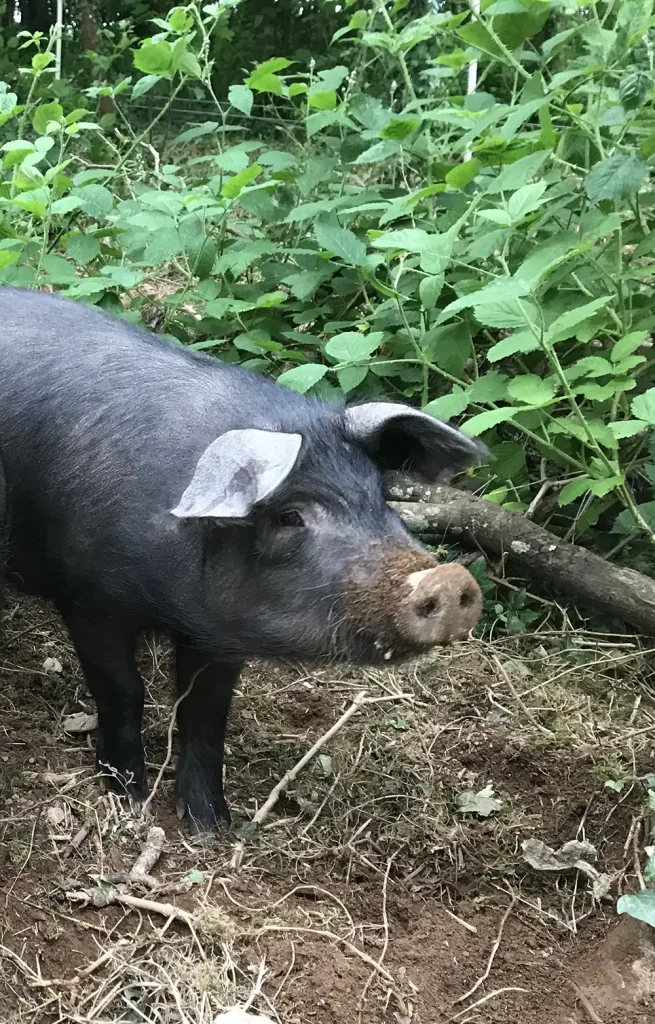
A better future for food
Discover how regenerative farming can create a better future for food, and why it should replace intensive farming practices.
At Rare & Pasture we source our meat from regenerative farms that prioritise soil health, animal welfare and the environment. We do this because we want our products not only totaste delicious but also be ethical, sustainable, and help improve our environment.
How Intensive Farming Harms the Planet.
Intensive farming has caused arable soils in the UK to lose about 40 to 60% of their organic carbon due to their unsustainable practices (Summary of the state of the environment: soil – GOV.UK). Routine ploughing, heavy use of synthetic fertilisers and pesticides, monocultures and a lack of biodiversity break down soil structure and biological life, accelerating the loss of soil organic carbon and therefore the release of CO₂ back into the atmosphere. Alongside this, the frequent use of heavy machinery and intensive tillage further increase greenhouse gas emissions.
The reliance on synthetic chemicals and the poor quality of intensively farmed soils also contribute to water, air, and soil pollution. Runoff from fertilisers and pesticides contaminates nearby water bodies, harming aquatic life and disrupting ecosystems. This has knock on effects throughout the food chain, reducing biodiversity and effecting food security.
Animal welfare is another major concern within intensive farming systems. Livestock are often confined in cramped conditions that restrict their ability to exhibit natural behaviours. Many never see grass, being rapidly fattened on high protein feeds such as imported soya and palm based products. These feeds carry a large carbon footprint and are often linked to deforestation in their countries of origin. High stocking densities also create nutrient hotspots from animal waste, which can leach into surrounding land and waterways, further harming local ecosystems. The stress and unnatural growth rates imposed on animals in these systems not only raise ethical issues but can also lead to poorer meat quality, including higher levels of unhealthy saturated fats.
This disturbance also exposes soil to the weather, increasing erosion and further degrading soil health, alongside wider environmental impacts. In 2010, soil degradation was calculated to cost the UK £1.2 billion every year, contributing to global warming through the release of CO₂, ultimately affecting our resilience to climate change and our long-term food security. (Summary of the state of the environment: soil – GOV.UK).
How Regenerative Farming Brings Life Back to the Land.
Regenerative farming manages land to improve and conserve soil health, regenerating life lost through intensive farming, while preserving, restoring, and increasing soil organic carbon, and ensuring high animal welfare and biodiversity
It does this through the following core regenerative principles:
- Minimising soil disturbance and reducing or eliminating synthetic inputs to protect soil life, retain organic carbon, and reduce greenhouse gas emissions;
- Increasing biodiversity to build resilience against pests and disease while improving nutrient density and soil function;
- Integrating livestock so that managed grazing returns nutrients via manure, and gentle hoof movement enhances soil structure and infiltration;
- Maintaining living roots and continuous ground cover to protect soils from the weather, sustain a constant flow of nutrients to the soil biology, and support ongoing carbon uptake and sequestration; and
- Ensure high animal welfare in pasture-based and outdoor reared systems, allowing livestock to express natural behaviours, reduce stress, and improve soil health. Slowergrown,
regenerative meat typically have healthier, more unsaturated fat profiles than intensive, fast grown animals.
Together, these regenerative principles minimise mechanical and chemical disturbance, protect existing soil carbon, and improve soil health, keeping it biologically active so it can store more carbon through living roots and microbial activity. They also shield soils from weathering and build a resilient structure that holds water and nutrients to feed soil organisms, which supports the growth of healthier plants, livestock and whole ecosystems.
Alongside this, they support high animal welfare, enabling animals to express natural behaviours and grow in a healthier, more natural way. Regenerative farming not only reduces on-farm greenhouse gas emissions and overall carbon footprint, but also increases the soil’scapacity to absorb and store carbon, helping to mitigate climate change by absorbing more CO₂ from the atmosphere.
Improves the Environment, Respects Animals, and Produces Delicious Meat.
Regenerative farming offers a hopeful alternative to industrial farming, one that restores soil health, locks away carbon, and brings life back to the land by working with nature rather than against it.
That’s why we source our meat from regenerative farms to support a system that improves the environment, respects animals, and produces nutrient dense meat, which is the foundation for the delicious, cured meats we create at Rare & Pasture.
We care deeply about the environment and about creating delicious food, something we believe should come hand in hand to create a truly sustainable food system that can be enjoyed in many years to come.